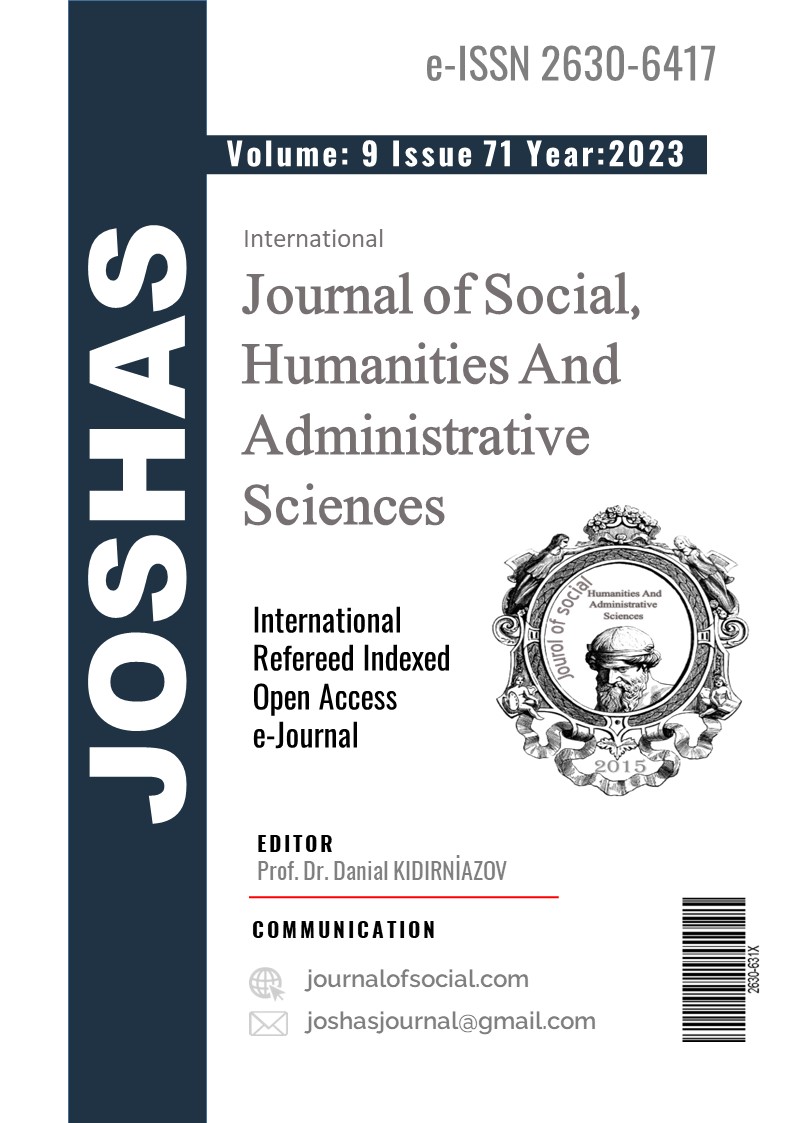2018 Coğrafya Dersi Öğretim Programı 11 ve 12. Sınıf Kazanımlarının Webb’in Bilgi Derinliği Taksonomisine Göre Analizi
Author :
Abstract
Çalışmada 11 ve 12. sınıf coğrafya dersi öğretim programında (2018) bulunan kazanımların, Webb’in bilgi derinliği taksonomisine göre analizinin yapılması amaçlanmıştır. Webb’in bilgi derinliği seviyelerine göre analiz edilmesinin alan yazına ve program hazırlayıcılara katkı sağlayacağının düşünülmesinden dolayı çalışmanın literatüre katkı sağlayacağı düşünülmüştür. Buna göre yapılan çalışma, doküman incelemesi yöntemi ile gerçekleştirilmiştir. Coğrafya dersi öğretim programı, Webb’in bilgi derinliği taksonomisinin dört seviyesi, sosyal bilimler için belirlenen fiiller ve kazanımların kapsamı da göz önünde bulundurularak analiz edilmiştir. Bu kapsamda Coğrafya dersi öğretim programında bulunan 11. sınıfta 29 kazanım, 12. sınıfta 24 kazanım olmak üzere toplamda 53 kazanımın sınıf ve ünitelere göre seviyeleri incelenmiştir. Webb’in bilgi derinliği taksonomisinde, kazanımların sınıflar, üniteler ve seviyeler arasında dengeli dağılmadığı tespit edilmiştir. Buna göre 11. sınıfta yer alan 29 kazanımın on beşi Seviye 3’te yalnızca biri Seviye 4’te bulunurken; 12. sınıfta yer alan 24 kazanımın yarısı Seviye 1’de bulunurken Seviye 4’te herhangi bir kazanım bulunmamaktadır. Bu sonuç karmaşıklık seviyesinin fazla olduğu görevlerin yer aldığı ünitelerde öğrencilerden beklenen düşünce düzeyindeki esneklik ve derinliğin gerçekleşemeyeceğini göstermektedir. Ayrıca hem 11. sınıf hem de 12. sınıf kazanımları Webb’in taksonomisine göre analiz edildiğinde birden fazla seviyenin en fazla yer aldığı ünitenin beşerî sistemler ünitesi olduğu en az kazanımın ise derinlemesine düşünme seviyesinde olduğu tespit edilmiştir. Analiz sonuçlarından da anlaşıldığı üzere 11. ve 12. sınıf CDÖP’de hatırlama ve stratejik düşünme seviyelerinde kazanımların daha çok yer aldığı, buna karşılık beceriler ve derinlemesine düşünme seviyelerinde kazanımların yetersiz kaldığı görülmektedir. Bu göstergeler, 11. ve 12. sınıf CDÖP’nin anlamlı öğrenmeyi gerçekleştirmede yeterli derecede etkili olmayacağı kanaatini oluşturmaktadır. Bu nedenle bilgi derinliği için öğretme ve öğrenmenin titizlikle planlanması gerekmektedir.
Keywords
Abstract
In the current study, it was aimed to make an analysis of the learning outcomes in 11th and 12th grade geography course curriculum (2018) depending on the Webb’s depth of knowledge taxonomy. It is believed that the analysis of made depending on Webb’s depth of knowledge taxonomy will make a contribution to the related literature and program developers. The study carried out in this sense was conducted through document analysis method. Geography course curriculum was analysed through four levels of Webb’s depth of knowledge taxonomy by taking the verbs and learning outcomes determined for social sciences into consideration. In this context, 29 outcomes at 11th grade and 24 outcomes in 12th grade, 53 outcomes in total, in the geography course curriculum were analysed depending on the grades and units. It was found in Webb’s depth of knowledge taxonomy that the outcomes were not distributed equally between grades, units and levels. Accordingly, fifteen out of 29 outcomes in the 11th grade were at Level 3 while only one was at Level 4; half of 24 outcomes in the 12th grade were at Level 1 and no outcome was at Level 4. This result shows that flexibility and depth cannot be realized at the level of thought expected from students in the units where the tasks with a high-level complexity. In addition, when the outcomes of both 11th and 12th grades were analysed depending on Webb’s taxonomy, it was found that the unit having more than one level was the unit of human systems while the least outcome were at the deep learning level. As is clear from the analysis results, it was determined that there were more outcomes at remembering and strategic thinking levels in the GCC for 11th and 12th grade, while outcomes were insufficient at skills and deep-thinking levels. These findings show that GCC for 11th and 12th grades cannot be effective at desired level in realizing a considerable learning. For that reason, it is of importance to make a neat plan of teaching and learning for depth of knowledge.





